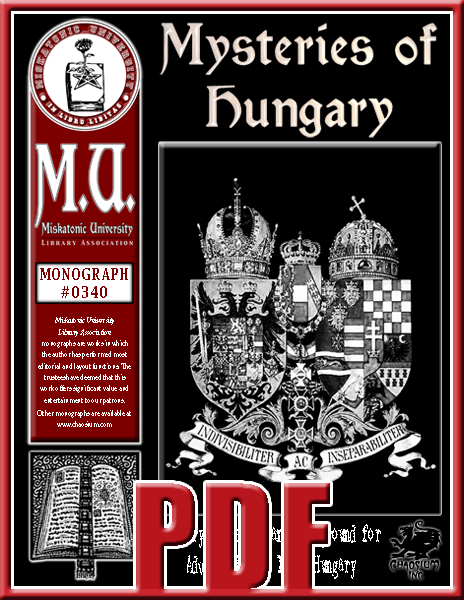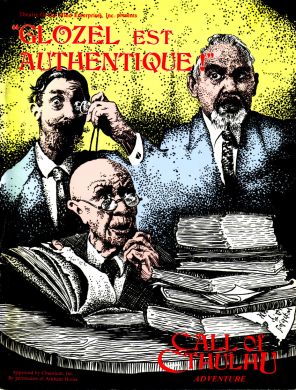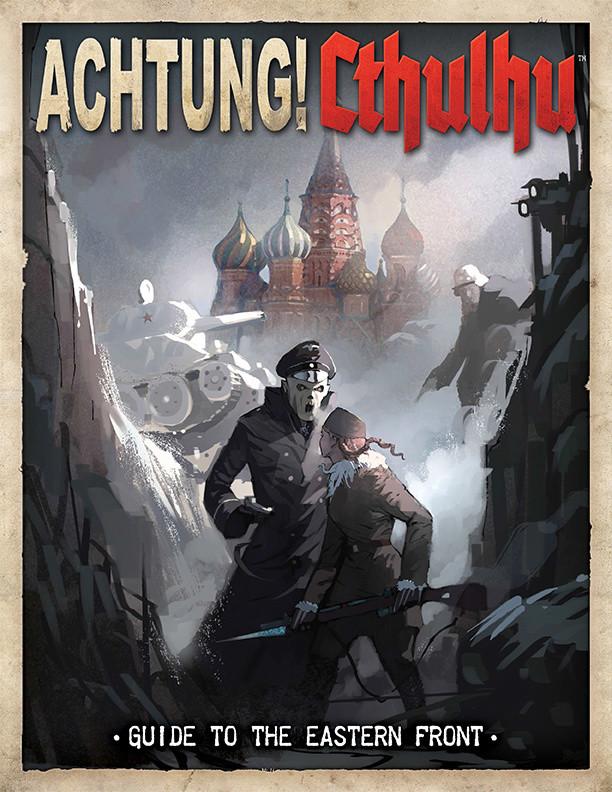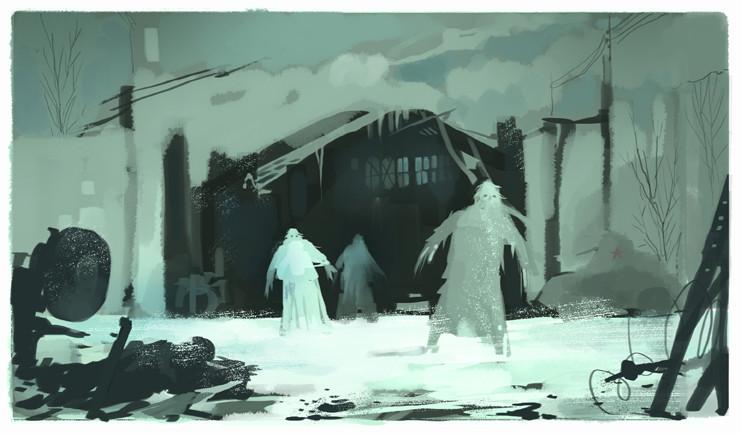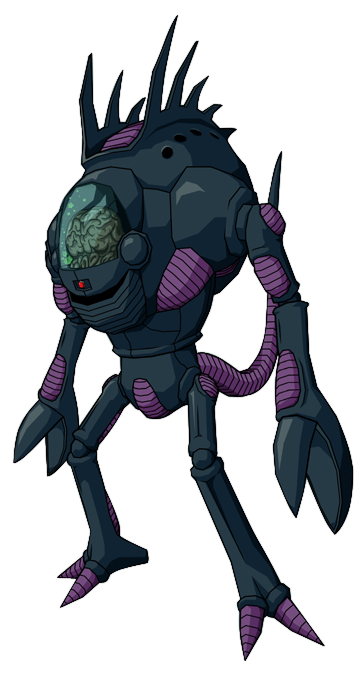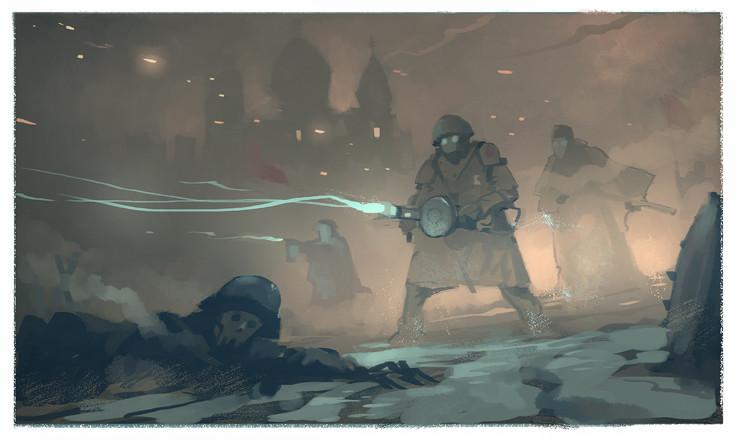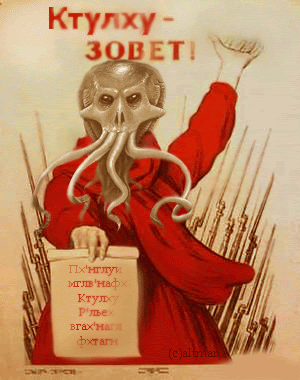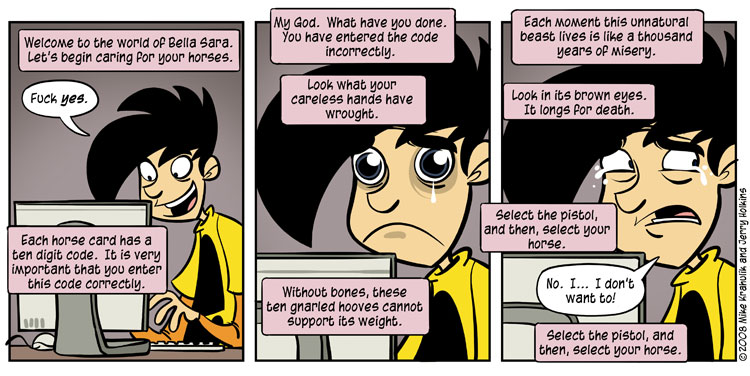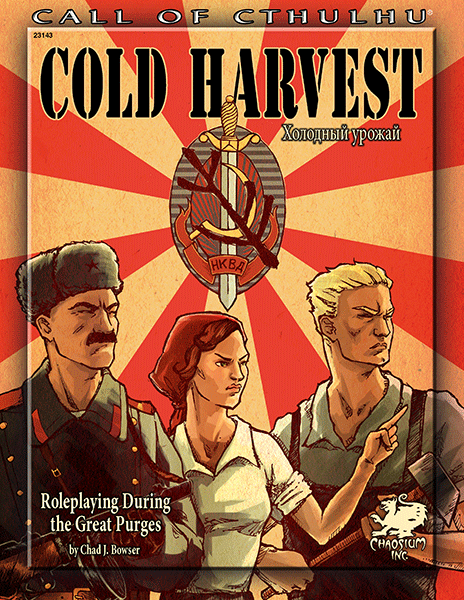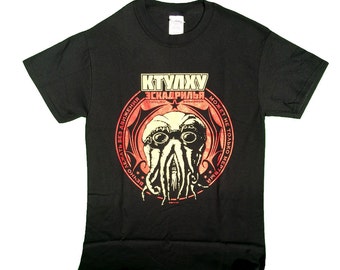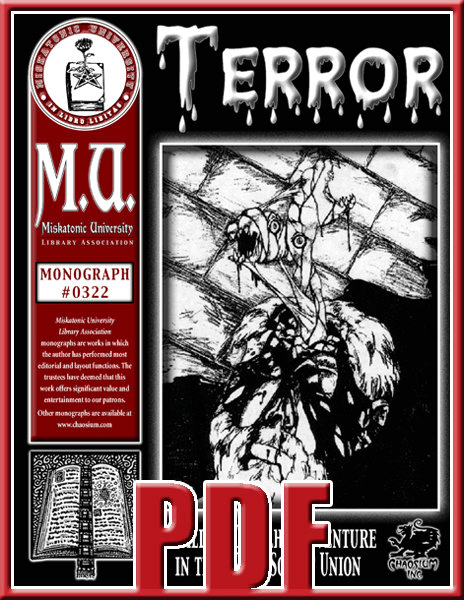 Shadows of Leningrad
Shadows of Leningrad (2010) from Goodman Games is part of their "Age of Cthulhu" adventures...which is basically the same thing as T.O.M.E. 27 years later. Maybe not surprising, this is one of the more entertaining...albeit bizarre...of the Russian Mythos adventures.
1927, an American expatriate painter Charlotte Geoffrey (sister of Justin Geoffrey, the mad poet of Arkham from Robert E. Howard's "The Black Stone") dies in Leningrad, setting in motion events...
CoC adventures are a little weird, in that they either like to front-load with a lot of backstory
or keep all the "surprises" for the end of the module; this is a front-loader. So we get a chunk of backstory about the
yeti and a Russian cult of Ithaqua, which was led by the Orkonov family; they were mostly all killed by Tsar Peter the Great, by the last descendant married Geoffrey and lived with her in the rebuilt ancestral home (which had the old temple to Ithaqua in the basement).
Anyway, Geoffrey committed suicide, and both her husband and her daughters wound up in an insane asylum; the PCs are here to buy her remaining paintings. Or maybe they want to find
The Book of Dark Winter, the central manuscript of Orkonov's family cult. Or whatever. The scenario throws out a couple of ideas for why the PCs might be there, but the assumption is that once they see the mystery they'll get drawn into it...or something.
Goodman Games uses "differentiated skill checks" (that would be +/- percentile modifiers to rolls), a preview of what you'd see in 7th edition, even though this was nominally for 5.6.1. They also recommend that all non-Russian characters be pitied and "given a base percentage of 50% in Other Languages (Russian)."
Anyway, the PCs arrive in Leningrad, and are immediately being tailed by the OGPU (secret police) - pretty much just as standard operating procedure. From there on, it's pretty much a sandbox with different "scenes" set at locales. So, Scene One is at the Orkonov
dacha, where they're greeted by the sight of a yeti in a butler's uniform.
 Be with you in a minute.
Be with you in a minute.
At the point where you have a talking, partially lobotomized ape serving you tea and vodka, I would hope you get the subtle hint that not all is right in Russia. Anyway, Jonah (the yeti's name is Jonah) gives them the run of the house, which includes finding a magical artifact called
the Medallion of the Bad Wolf (which, despite the name, turns you into a vampire - at the small cost of 20 SAN). The house is actually a bit of a PC trap, since:
1) It is decorated by Charlotte Geoffrey's paintings
2) Each painting calls for a SAN check
3) PCs are assumed to have caught sight of the paintings unless they are specifically stated to not be looking at them
4) PCs are automatically assumed to have their attention caught by the painting and look at them unless they specifically state they're not looking at the goddamn paintings. Seriously, there's a whole dark gods damned sidebar on exactly that. You could make twenty SAN checks in this house easy.
Anyway, aside from that there's a weird cuckoo clock, the enchanted paints she was using, a series of letters between Charlotte and her brother, a copy of
The People of the Monolith, and the Orkonov's personal safe (which they can convince Jonah to open, and has fat stacks of cash - 50,000 rubles!)
There's also the basement, but they save that for Scene 4.
Anyway, Scene 2 is the Revolution Hospital, where the surviving family members are - Alexei is insane, Elena is insane
and a cultist planning to summon and bind Ithaqua, and Katarina is a vampire whose first attempt is to get a PC alone to eat them by pretending to have a secret.
 Child vampire? Ape butler? No, seriously, check and make sure this is a Cthulhu adventure.
Child vampire? Ape butler? No, seriously, check and make sure this is a Cthulhu adventure.
Scene 3 is at the State Museum, where the PCs can
coincidentally buy up the rest of Charlotte Geoffrey's paintings for the money they rifled from the Orkonov's safe; one of these paintings is technically important to the plot since it has a map to the Frozen Temple on the back. You also get to make a few more SAN checks for looking at her paintings, then fight 3 Enchanted Pythons.
 I'm freesssing my asssetsss off! I'm cold-blooded, and thisss is Russsia in the fucking winter! Who booked thisss gig? They're not even Yig cultissstsss!
I'm freesssing my asssetsss off! I'm cold-blooded, and thisss is Russsia in the fucking winter! Who booked thisss gig? They're not even Yig cultissstsss!
Investigators are supposed to be 2 and 2 together and figure out that Elena and her ballet instructor are trying to summon Ithaqua, but to do that they need kid vampire, the painting with the map to the Frozen Temple, and a staff-thingy. The PCs are supposed to have enough clues by this point to go
back to the Orkonov
dacha and check the basement for the ruined temple (accessed by setting the cuckoo clock at 2 minutes 'til midnight - look, you come from an insane family, you're lucky you didn't get a
cocksmith [NSFW link] instead of a locksmith).
Anyway, faily temple has a copy of
The Book of Dark Winter, half of a dying guy (literally, "his lower torso, from the waist down, is completely missing. He drag himself with his hands towards the investigators.") the PCs can question, three zombies, another medallion, and a Moon Beast! (PCs are not expected to fight the Moon Beast).
The PCs can then either head to the ballet theater to stop Elena's bloody version of Swan Lake or, if they've fucked up, head to the Frozen Temple of the Khanate.
Turns out, Elena's staff is a nifty device that converts the SAN people around her lose into temporary magic points. Nice drop! Unfortunately, to charge it up she's going to take a crowded theater full of people and make them lose a
lot of SAN by staging a live murder or three on stage. PCs that sneak into the back can confront Boris (Elena's ballet coach/boyfriend/cultist), who is stealing mad stacks of cash (75,000 rubles) - dude, you're about to summon Ithaqua into the world. What the fuck do you need the money for?
Anyway, the showdown is supposed to go down in Scene 6, with the Frozen Temple of the Khanate. If the PCs had just bribed the Sanitarium to drug up Elena this would not have been an issue, but they probably didn't do that so now they have to face an indeterminate number of cultists, a couple yeti, some Gnophkehs, pissed-off kid vampire Katarina and (probably) staff-wielding minor sorceress Elena...and that's if Elena doesn't manage to summon and bind Ithaqua.
Rest of the book is pregenerated characters and handouts.
Gameplay Perspective: Quasi-linear sandbox. That's not a terrible format for CoC. The thing that kills me is the need to invent not
one, but like four or five different unique-to-this-scenario artifacts for this particular scenario to play out. I mean, is it really that fucking hard to summon Ithaqua that we need vampire-making amulets and SAN-powered eldritch staffs
and magic paints and a tome which doesn't actually have many relevant spells? Okay,
The Book of Dark Winter has Dismiss Ithaqua, so it's not useless, but a certain amount of conservation of game mechanics is useful here.
Russian Perspective: We don't actually
see a lot of Leningrad, despite this being
Shadows over Leningrad. Whole thing is only 46 pages, and the Keeper is supposed to fluff pretty much everything. If you want to gear up on Russian period weaponry before going after the Frozen Temple, I hope your Keeper is packing another book with the stats!
Mythos Perspective: I find the yeti problematic. Not because the Mythos doesn't have room for ape people - "Arthur Jermyn" is totally a thing - but because the whole Abominable Snowman routine was supposed to be a cover for the Mi-Go. Also, I have no idea why we have vampires here. Like, at all. I can deal with the random moon-beast and the convenient zombies and even the poor enchanted snakes, but why the fuck does it matter that Katarina is a zombie? Why is that a thing? What the fuck does it add? Can't she just be
crazy and
think she's a vampire? I do like the fact that Russia has an ancient Ithaqua cult, though. That works out fine. I'd like it more integrated into the setting, but take what I can get.
Obvious Gaps: The basic assumption of this adventure is that the player characters 1) have no authority, and 2) are not bastards. If the Keeper was following the suggestion in
Cold Harvest where this was part of an NKVD campaign, Elena and her boyfriend would probably be on their way to a work camp in Siberia and executed on the way there, job well done and pass the vodka.

